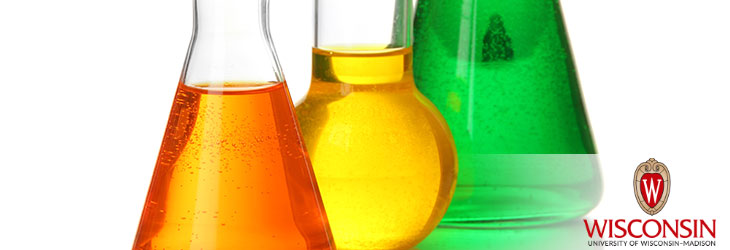Materials & Chemicals

Palladium-Based Catalysts Herald Greater Efficiency of Alcohol Oxidation to Esters and Acids
WARF: P130355US02
Inventors: Shannon Stahl, Adam Powell, Thatcher Root, David Mannel, Maaz Ahmed
The Wisconsin Alumni Research Foundation (WARF) is seeking commercial partners interested in developing improved methods of synthesizing esters and carboxylic acids from organic alcohols.
Overview
Converting hydrocarbon feedstocks like shale natural gas into higher value fine chemicals and pharmaceuticals requires the oxidation of various functional groups. However, oxidizing alcohols to carboxylic acids and esters has proven difficult, as the reactions typically are hazardous, inefficient or nonselective. The conversion may rely on toxic, corrosive and/or explosive materials, and catalysts used in this process often are costly or have limited effectiveness.
The Invention
Utilizing heterogeneous palladium-based catalysts with co-catalysts such as tellurium or bismuth, UW–Madison researchers have developed a new method for the efficient synthesis of esters and carboxylic acids from organic alcohols.
To form an ester, an organic alcohol is reacted, in the presence of oxygen gas, with methanol or ethanol. The reaction occurs in the presence of the palladium-based catalyst and the co-catalyst. To form an acid, water can be added to the reaction mix.
To form an ester, an organic alcohol is reacted, in the presence of oxygen gas, with methanol or ethanol. The reaction occurs in the presence of the palladium-based catalyst and the co-catalyst. To form an acid, water can be added to the reaction mix.
Applications
- Efficient aerobic oxidation of primary alcohols to esters and acids
- Industrial, pharmaceutical and basic organic chemical research and development
- Production of pharmaceuticals and commodity chemicals
Key Benefits
- Limits hazardous materials with increased recyclability
- Enables more efficient use of catalysts
- A wide range of starting substrate alcohols can be used with high selectivity.
- Improves control of reaction conditions
- Demonstrates recyclability in batch
Stage of Development
The researchers have demonstrated yields of more than 90% esterification from representative alcohol substrates within 8 hours and yields of more than 99% in 2 hours from benzyl alcohol. Reaction rates improved by nearly two-fold for a number of tested alcohols.
Additional Information
For More Information About the Inventors
Related Intellectual Property
Publications
- Mannel D. S., Stahl S. S. and Root T. 2014. Continuous Flow Aerobic Alcohol Oxidation Reactions Using a Heterogeneous Ru(OH)x/Al2O3 Catalyst. Org. Process Res. Dev. 18, 1503-1508.
- Powell A. B. and Stahl S. S. 2013. Aerobic Oxidation of Diverse Primary Alcohols to Methyl Esters with a Readily Accessible Heterogeneous Pd/Bi/Te Catalyst. Org. Lett. 15, 5072-5075.
Tech Fields
For current licensing status, please contact Jennifer Gottwald at [javascript protected email address] or 608-960-9854